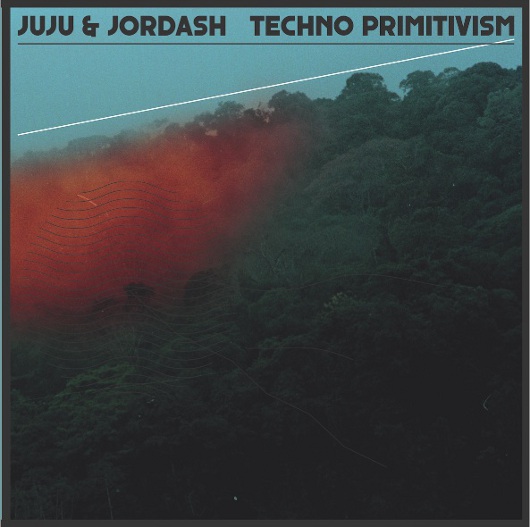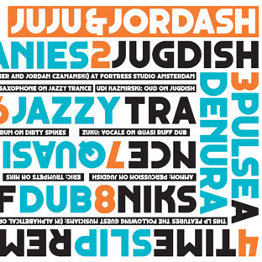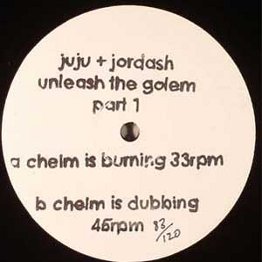Riding the Rogue Wave with JuJu & Jordash

“It would be tough for us to float around an abstract world full of aesthetic concepts without having the real world creep up inside our business. There’s not enough dope in the world for that.” So says Jordan Czamanski, one half of Amsterdam based duo Juju & Jordash.
The comment is in reference to their recent 12″ singles that have challenged audiences with markedly different references to their Jewish heritage, namely the Unleash The Golem series, based on a live score they did for the 1920 silent horror film Der Golem, and the considerably more playful JEWSEX 12″ replete with lurid artwork. Both releases were signed up to Phil South’s consistently excellent Golf Channel imprint, and the label
Next month however sees the focus shift to the release of the third Juju & Jordash studio album, Techno Primitivism, via boutique Amsterdam label Dekmantel Records, with whom the duo released their first LP back in 2009. The physical nature of the album itself is enough to get the vinyl lover panting heavily – it’ll be pressed on triple heavyweight vinyl with a full colour gatefold sleeve – but the musical content brings a new level of cohesiveness and fluency to the JuJu & Jordash sound, the result being a 15 track set that wanders effortlessly from soundtracky coldwave to raw analogue house and reverb-laben dub techno. We caught up with Jordan and Gal ahead recently to discuss the album, angry young film-makers and more.
Your new LP Techno Primitivism is out next month on Dekmantel, and it’s quite an ambitious set with fifteen tracks. Could you give us some insight into the recording process – how long did it all take and what were your main inspirations?
Gal: Late last year we decided we are going to record a new album. We didn’t really know how many tracks it was going to be or what the plan was, but we started doing a series of jam sessions in the studio, keeping in mind they should end up eventually in one package. We wanted to try out many different kinds of setups in the studio, different gear, different tempos and moods. When it came to the point that we had hours of material, we started choosing our favorites and let it stew for a while. It was hard at first to choose 15 out of at least 25 jams we had, but we decided to limit ourselves to the 3×12″ record format. Once we chose, we started polishing those ideas, edited them down, added some overdubs and so on. Lastly there was a period of mixing everything down.
It’s also hugely enjoyable, you must be happy with the results?
Jordan: Glad you are enjoying it! Not that many people have heard it yet, so each time we hear back from one of them it’s a big deal. I’m pretty happy with the record. It’s good that we left it alone at the stage we did but there are always little things that bother me listening back to our stuff. It’s only natural. The day I’m 100 per cent happy with our stuff is the day it starts getting boring.
Gal: 99 per cent happy. I’m more forgiving.
Techno Primitivism seems like an interesting album title too– we are guessing it’s linked to the artistic movement? On tracks such as “Rogue Wave” and “Peligroso” it seems like you are trying to merge the mainframe of techno with other stylistic themes?
Jordan: Well, the title of the album and actually all the song titles were chosen long after all the music was produced. We weren’t really trying anything consciously while recording the album. That’s a big advantage of working the way we do, improvising, jamming – no intellectual bullshit directly or intentionally clouding our music. It’s full of intellectual bullshit in our sub-conscience of course, but it’s BS once removed. Better. The title does reference the artistic movement – it seemed fitting in retrospect.
You’ve obviously got a really strong working relationship with Dekmantel, was it a joint decision to release the album on triple 180gm vinyl (that’s more than a half a kilo of wax right there) or did Thomas and Casper take some persuading?
Jordan: And full color gatefold! No persuading was needed, just a little number crunching. Dekmantel are down with the cause.
Regular Dekmantel designer Orpheu de Jong seems to have taken full advantage of the space afforded on a triple gatefold sleeve – did he get a specific creative remit or did you give him a blank canvas to work with?
Jordan: We sat down at our studio, played him the album start to finish. Only notes we had for him is that we wanted the cover to represent the music. A natural aesthetic. We sent him a copy of the album and I guess he stewed with it for a while and sent us this awesome cover a couple months later. I’m really happy with it.
How do you feel Techno Primitivism compares to your self titled debut album from 2009? What’s changed with regards to your studio set up and recording processes in the interim period?
Jordan: I think Techno Primitivism is way better. There are some cool cuts on our previous album but to me the one from 2009 felt more like a compilation of J&J stuff from 2007-2009 and not like a cohesive album. We could of scrapped that album and released three separate EPs and called it a day: same aesthetic impact. In the case of Techno Primitivism it’s like a real album. The difference is that this time around we decided ‘let’s record an album’ and in the following nine months, all we did (except a few remixes) was work on the album. All our jams were recorded towards it. It’s a premeditated album, so any perceived cohesiveness is likely due to time and space more than to aesthetic intentionality.
Gal: I think having the debut album released was very important in our musical evolution. I still like those tracks a lot. By putting the first one out we became more confident and focused towards getting it done “our way”. Plus, this time around it was all recorded in our own studio, with no guest musicians.
As producers you must feel a lot more confident now too right? You seem to have carved a nice niche within the Amsterdam community which is regarded well beyond.
Jordan: Sometimes I’m confident as hell, sometimes I’m a mess. I don’t really know about the niche thing within Amsterdam, but we really appreciate anybody who shows interest in our music and seems to enjoy what we do.
Speaking of Amsterdam , it must feel nice to be involved in a city that constantly sprouts new musical talent.
Gal: Amsterdam is really great in that respect. A lot of talented of producers and DJs, not to mention gear heads and vinyl addicts.

Let’s discuss your output for Golf Channel, which seems to present both your serious nature and also a fun side. Firstly, what’s the specific premise behind the Unleash The Golem series? The inspiration came after you guys scored the 1920 silent film Der Golem: wie er in die Welt kam, is that correct?
Gal: Yes, that’s correct. Last summer we were approached by a local organization which organized a series of movie screenings themed: “an unorthodox view of judaism in film”, to play live a new score for the movie Der Golem. During the preparation period for this project, we started collecting a lot of musical ideas, themes and specific sound designs that felt fitting. Our live rendition of the score was mostly improvised together with our friend, double bass player Ilya Ziblat Shai, in the movie theater, but we felt we had a lot of strong material to explore on a recording. You can say the movie inspired the soundtrack and the soundtrack inspired the EPs. Since then, we have played the score live a few more times (one of them with David Moufang) in different movie theatres and meanwhile recorded and mixed the first tracks now known as Unleash The Golem Part 1&2. Being long time fans of Golf Channel, we were more than thrilled that Phil South was very enthusiastic and supportive of the project from the start, which made the series come to fruition more smoothly.
How do you plan to explore these themes on future Unleash The Golem releases? There are more planned right?
Jordan: Hell yeah! There are three more left. The second one is up for pressing soon. Dark, dark stuff. We’re working on number three and four these days. Our plan is to work with a few other musicians for the fourth instalment. Sax, double bass, maybe trumpets and a drummer… we would like to go there.
And with the more recent JEWSEX 12” there was some humorous visual symbolism on the art work that proved divisive in the Juno Plus office – what was the thinking behind this release?
Jordan: Divisive is what we were going for! I just bought a Korg Polysix – this was one of the first recorded jams with the new family member. I came up with the title while brushing my teeth. We felt that things were becoming way too heavy and serious working on the first two Golem 12″s and we needed a break. An extinguisher. We had a few cover ideas we tossed around with Phil South. The final JEWSEX cover is actually the soft-core version. Phil was rooting for something hard! The final version is a tame collaborative effort. The classy version, PG-13.
So much contemporary electronic music is bereft of meaning, especially political meaning, but JEWSEX and Unleash The Golem were loaded with sledgehammer symbolism. Why did you guys decide to take this approach to the title of the record and its artwork?
Jordan: It just came naturally. Letting loose, pissing some people off and such. A way to deal with things. I guess we reached the point where we are confident enough to do whatever we want without worrying too much about looking a fool.
Did you guys hope to provoke a response from a electronic music community that doesn’t seem as politically charged as it once was?
Jordan: No agenda here, not trying to change anything in the way other producers deal with stuff – just trying to deal with a shit-load of our own issues and in the process stir up a few emotions. Just a good natural outlet. It would be tough for us to float around an abstract world full of aesthetic concepts without having the real world creep up inside our business. There’s not enough dope in the world for that, and of course “everything is political” blah blah blah.
Adding a certain title, artwork or video to a piece of music obviously can fill it with a certain mood or feeling, but did your recording and creative process for the Unleash The Golem/JEWSEX material differ significantly to how you approach your other material?
Gal: I don’t think we approached it so differently as far as the creative process go. Maybe we had the freedom to make even longer, darker and more abstract tracks for the Golem series, but that’s about it. It’s more about the mood and context of things.
Your Magic Mountain High performance with Move D at Freerotation was mentioned in glowing terms on our recent review, how is the project developing and can we expect some more recorded material any time soon?
Gal: Yes, Freerotation was definitely one of (if not the) highlight of the year, what an amazing experience! As for MMH, we are all really into this project, both live and in the studio, at least as far as the time and geography limitations allow it. Recording and playing with Move D has been a ton of fun. We have a lot of recordings in the vault, and some of it will definitely see the light of day as soon as possible. Meanwhile we are gearing up for our next live show as MMH, our first in the Panorama Bar as MMH, on September 22. Gonna be tasty.
You recently premiered the video for Dr Strangepork – how did you come to hook up with James Murray on this and how do you see his interpretation of the track?
Jordan: I posted something on Twitter asking for an angry young film-maker and we were extremely lucky that James follows us and was interested. I absolutely love the video. Don’t know what else to say – he nailed it. He made a video that doesn’t simply accompany the music, and that’s what we were aiming for – a collaboration. The video itself is of course open to a range of interpretations in a wide emotional spectrum as any good art is.
Questions: Tony Poland & Aaron Coultate
Main image: Carolina Georgatou
LP cover art: Orpheu de Jong

